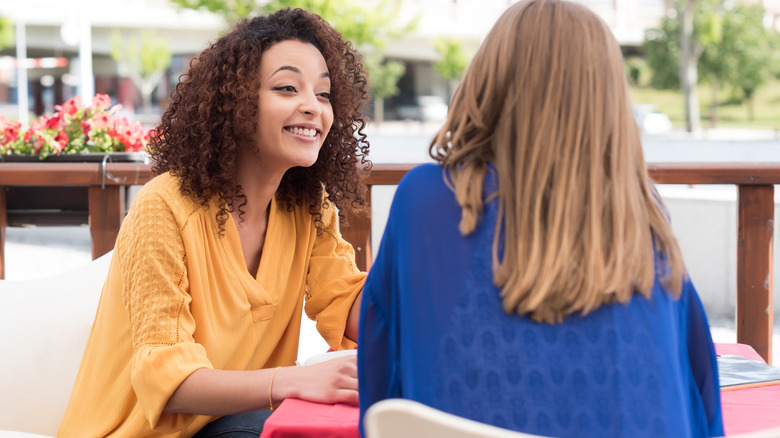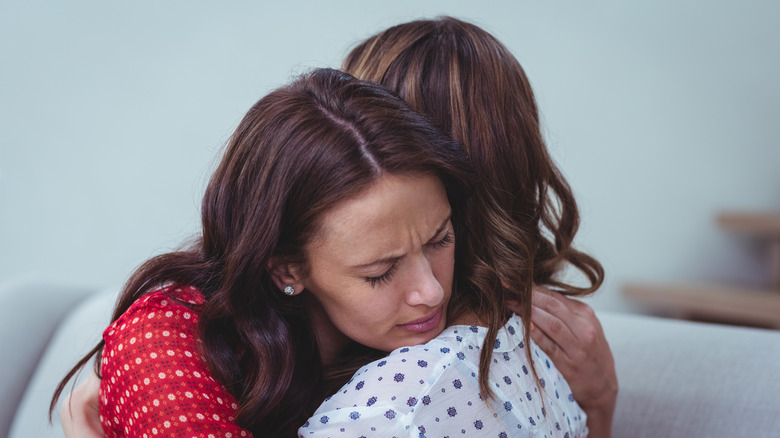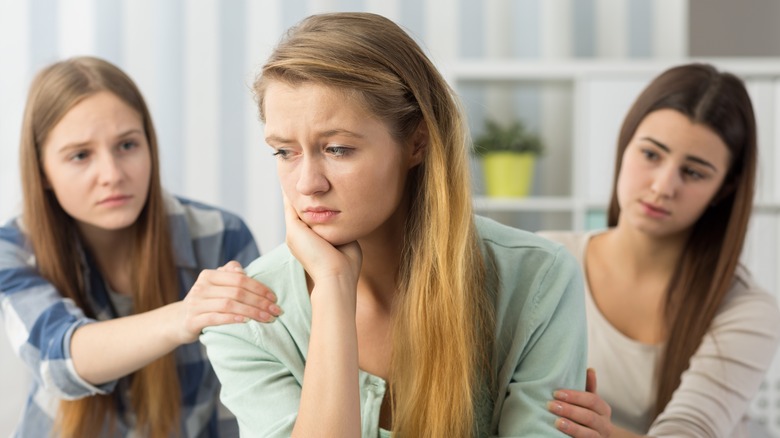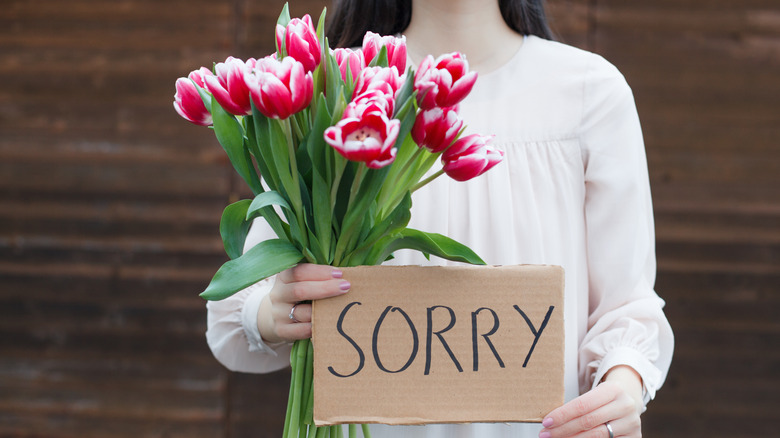Small Ways You Can Be A Better Friend
Over the course of your life, many different friendships will begin and end. They'll ebb and flow as you grow and your life changes, through big moves, breakups, new jobs, engagements and weddings, or the journey towards starting a family, if that's what you choose.
There are all different kinds of friends — old friends who have been part of your life, it seems, for as long as you have, college friends, coworker friends, friends you meet in the midst of a postpartum breakdown, friends who are like family, and friends who are really no more than acquaintances. Throughout the course of these friendships, there will undoubtedly be times when you're the picture of loyal selflessness, and other times when, well, you don't put in as much time with them as you probably should.
Working to be a better friend might sound like a major undertaking, but it doesn't have to be. There are plenty of small things you can do to make a real difference. From returning calls to offering to pitch in and help out when they need it, making steps toward being a better friend is about little, thoughtful things, rather than a big, grand gesture.
Listen
It's disconcerting when someone you care about clearly isn't listening to anything you're saying. Everyone gets distracted sometimes, but being a good friend is about listening as much as it is about talking (maybe even more).
As Dr. Vivian Sierra, St. Louis-based life coach and counselor, told me via email, "Listening is a common characteristic of successful relationships. Listening non-judgmentally is particularly powerful. Listening has many positive consequences. Listening sends the message that you take interest in your friend. Listening well also allows for the opportunity to know the other person. People don't learn much when they're talking."
Don't spend your conversation thinking about what you're going to say next rather than listening to what your friend is saying now.
Keep secrets
There's a certain betrayal that cuts to the core, you when you discover a friend has been sharing private details about your life. It can also sometimes be difficult not to share, depending on what you've been told, or the dynamics of your relationship.
April Masini, New York-based relationship expert and author, told me via email that you should keep those things to yourself. "In this age of fast and free information, don't blab — or hit the send button — when your friend tells you something that's private, no matter how salacious and how much you want to tell your mom or your partner. Keeping secrets builds trust, and when you break that trust, it's tough to get back," she says. "A good friend is discreet and asks if it's okay, before telling."
Ask questions
Part of having an actual conversation is asking questions and listening to the answers. All too often, however, people get sidetracked and so focused on what they want to say, that the conversation is entirely one-sided.
Christene Lozano, licensed marriage and family therapist, told me via email that asking questions is one tiny thing that you can do to be a better friend. "Genuinely ask how your friends are doing, and don't take 'I'm fine' as an answer," Lozano wrote.
Be empathetic
As Bruce Cameron, a licensed counselor and psychotherapist specializing in relationships, told me in an email, a great way to be a better friend is to "be mindful and empathetic." Empathy allows you to be there with your friend in a different way and really understand what they're going through or how they're feeling — something that's not always easy, otherwise.
Make time for them
Strong friendships take time and attention. Yes, of course, there are periods of time when you're both busy and don't have as much time as you'd like, for hour-long phone chats or leisurely dinners, but one of the ways that you can be a better friend is to do what you can to make time for your friends.
"In order to be a better friend you have to be intentional about carving out time to cultivate your friendship. As you grow older and lives change and circumstances become more demanding, it is challenging to find adequate time to be a friend," licensed professional counselor Shannon Battle told me via email. "Friends must find ways to get creative to stay connected."
Show gratitude and appreciation
Your friends likely mean a whole lot to you. Don't forget to show them how much they matter. "Expressing appreciation for your friend makes a difference in your life. The appreciation can be through actions, but also simply by who they are," Dr. Sierra said. "People remember how you make them feel, and if you make them feel good, then you'll have a good friendship."
It's also important to work on gracefully receiving gratitude and appreciation, which can be quite difficult for some. "At the same time, accepting thanks and gratitude from our friends is also really important," psychologist Dr. Sally Nazari, owner of Chrysalis Psychological Services and host of Beyond the Couch podcast, told me, via email.
"Sometimes, it means a lot to be able to give to the meaningful people in our lives. Letting someone give us thanks can strengthen the bonds between us," she said.
Don't talk about them behind their back
This may sound like common sense, but talking about a friend behind their back can be really hurtful. "If you want to be a better friend, be someone who never speaks negative words about your friend to others," blogger Lauren Hamilton told me, via email. "Be the friend who shows up to help celebrate the good times and is there to provide a shoulder to lean on during the hard times."
It's tempting to spill the beans sometimes — especially when someone's done something that you don't agree with, or is hurtful. You're only human, after all. Giving in to the temptation, however, can have real consequences. You'll be a better friend and your friendship will be stronger if you can try your best to refrain.
Know when to intervene
When you're with friends, the last thing you want is to be judged for what you've done or said. Often, feeling judged makes you feel defensive and very, very small. At the same time, sometimes a friend does something destructive that requires other friends to intervene. Offering guidance is all part of being a good friend.
Breezy Richins, a freelance writer and editor, told me via email, "Being a better friend is knowing when it is imperative that you step in and tell them what they need to hear (as opposed to what they want to hear), and help them get back on course. It's a two part deal: being honest and helping them move forward. Being honest and walking away makes you look more like a jerk than a friend."
Be encouraging and supportive
Everyone wants supportive friends. Friends that encourage you to go for the big promotion, the relationship you want, the degree you need for your dream career. "Be the support system that they need — especially in times where they are undergoing challenging situations. Let them know that you are there for them without the need to jump in to solve their problems," Melody Pourmoradi, a life and wellness coach, shared with me.
Everyone needs to be supported differently though. "Support can come in many different forms. [Ask] them how they want to be supported," Pourmoradi added.
Say you're sorry
It happens to everyone from time to time, even in the strongest of relationships. You make a mistake for which you need to apologize. One way to be a better friend? Suck it up and sincerely and thoughtfully apologize.
"If your friend is upset with you, talk it out without getting defensive," Kimberly Hershenson, a New York City-based therapist specializing in relationships, told me by email. "Acknowledge what your part was (even if it was simply upsetting your friend) and discuss what you could do differently in the future."
Show up
Everyone wants to cancel plans at the last minute in favor of a night in with takeout and trashy TV, especially if the plans weren't really set in stone. Be a better friend by making sure that even if all of your other friends blow off your friend's happy hour plans, you show up.
Dr. Ben Michaelis, a clinical psychologist and creator of OneMinuteDiagnosis.com, said in a statement that, "One of the best small ways to be a better friend is very simple: show up. In our over-scheduled over-tech world many of our relationships exist only in cyberspace — but think about how you build real relationships — you show up."
Be present
Nowadays, there's so much that fights for your attention. It's difficult to put aside your phone — lighting up with social media notifications, text messages, and emails — to focus on just being there with your friend, but doing so is just one small way that you can be a better friend.
"The fact that social media has whittled away our attention span where the average person nods off after 400-word articles or has an attention span of about 5 minutes is not an excuse to look around and be aware. Making a conscious effort can go tremendous distance," psychologist Dr. Anjhula Mya Singh Bais told me by email.
Don't forget to take care of yourself
It may sound backwards, but one of the ways that you can be a better friend to others is by taking care of yourself.
Beth Gayden, an author and love coach, told me by email that "the abilities of loving yourself and putting yourself first give you the energy to truly show up and be present in your relationships. The ability to prioritize yourself enables you to be the kind of friend/lover that you would want to have in your own life. Learn to love, accept and appreciate yourself so you can love others more freely. You can love others with a sense of wholeness and plenty to give when you fill your cup of well-being first. After all you cannot give what you do not have."
Being a better friend is something you can work on
If you want to be a better friend, you can learn how — you're not a lost cause. "Start small (reaching out) and go from there. We can become more aware of our friends and where they're at — the more you put into a friendship, the more you'll get out of it," Nicole Zangara, a licensed clinical social worker and author of Surviving Female Friendships: The Good, The Bad, and The Ugly told me by email. "We have to nurture friendships, just like we have to nurture our romantic relationships. It takes work and if we stop investing, the friendship will dissolve."
Committing to maintaining and growing friendships takes work, but if you break your larger goal down into smaller, more manageable daily things that you can do, pretty soon, you'll be a much better friend.














